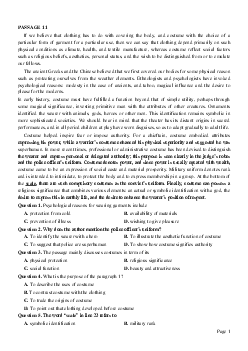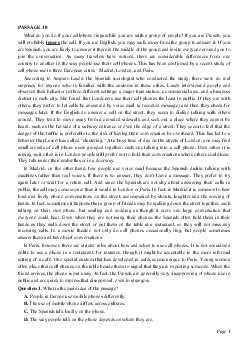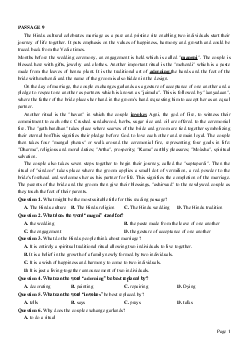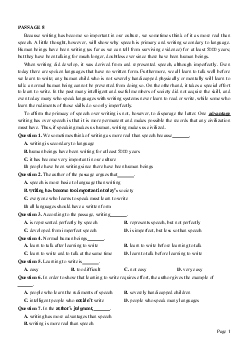


Preview text:
PASSAGE 18
Although I left university with a good degree, I suddenly found that it was actually quite hard to find a
job. After being unemployed for a few months, I realised I had to take the first thing that came along or
I'd be in serious financial difficulties. And so, for six very long months, Í became a market research telephone interviewer.
I knew it wasn't the best company in the world when they told me that I'd have to undergo three days of
training before starting work, and that I wouldn't get paid for any of it. Still, 1 knew that the hourly rate
when I actually did start full time would be a lot better than unemployment benefit, and I could work up
to twelve hours a day, seven days a week if I wanted. So, 1 thought of the money I'd earn and put up with
three days of unpaid training. Whatever those three days taught me - and I can't realty remember anything
about them today - I wasn't prepared for the way I would be treated by the supervisors.
It was worse than being at school. There were about twenty interviewers like myself, each sitting in a
small, dark booth with an ancient computer and a dirty telephone. The booths were around the walls of
the fifth floor of a concrete office block, and the supervisors sat in the middle of the room, listening in to
all of our telephone interviews. We weren't allowed to talk to each other, and if we took more than about
two seconds from ending one phone call and starting another, they would shout at us to hurry up and get
on with our jobs. We even had to ask permission to go to the toilet. I was amazed how slowly the day
went. Our first break of the day came at eleven o'clock, two hours after we started. I’ll always remember
that feeling of despair when I would look at my watch thinking, "It’s must be nearly time for the break",
only to find that it was quarter to ten and that there was another hour and a quarter to go. My next thought
was always, "I can't believe I'm going to be here until nine o'clock tonight."
The most frightening aspect of the job was that I was actually quite good at it. "Oh no!" I thought.
"Maybe I'm destined to be a market researcher for the rest of my life." My boss certainly seemed to think
so. One day - during a break, of course - she ordered me into her office. "Simon," she said, "I'm
promoting you. From tomorrow, you're off telecoms and onto credit card complaints. I'm sure you can
handle it. There's no extra pay, but it is a very responsible position."
Three weeks later, I quit. It was one of the best decisions I've ever made.
Question 1. Why did the writer become a market research telephone interviewer?
A. He had completely run out of money.
B. He had the right university degree for the job.
C. It was the first job he was offered.
D. He knew it was only for six months.
Question 2. The writer had doubts about the company when .
A. they only offered him three days of training.
B. they told him he wouldn't receive payment for his training.
C. they told him he had to be trained first.
D. he was told what the hourly rate would be.
Question 3. His workplace could be best described as . A. large and noisy. B. silent and dirty. C. untidy and crowded.
D. old-fashioned and uncomfortable.
Question 4. How did he feel when he realized it wasn't time for the break yet?
A. He felt that he would have to go home early.
B. He felt that he wouldn't survive to the end of the day. Page 1
C. He felt that the end of the day seemed so long away.
D. He felt that he must have made a mistake.
Question 5. What was unusual about Simon's promotion?
A. It showed how good he was at his job.
B. It meant he would be phoning different people.
C. It involved greater responsibility.
D. There was no increase in salary. ĐÁP ÁN 1-C 2-B 3-D 4-C 5-D
LỜI GIẢI CHI TIẾT Question 1:
Tại sao nhà văn trở thành một người phỏng vấn nghiên cứu thị trường điện thoại?
A. Anh ấy đã hết tiền.
B. Ông có bằng đại học phù hợp với công việc.
C. Đó là công việc đầu tiên anh ấy được đề nghị.
D. Anh ấy biết nó chỉ trong sáu tháng.
=> Dẫn chứng: After being unemployed for a few months, I realised I had to take the first thing that
came along or I'd be in serious financial difficulties. And so, for six very long months, Í became a market
research telephone interviewer.
Dịch: Sau khi thất nghiệp được vài tháng, tôi nhận ra mình phải làm công việc đầu tiên được đề nghị hoặc
sẽ gặp khó khăn nghiêm trọng về tài chính. Và thế là, trong sáu tháng rất dài, tôi trở thành người phỏng
vấn nghiên cứu thị trường qua điện thoại. Question 2:
Người viết đã nghi ngờ về công ty khi .
A. họ chỉ đề nghị anh ta ba ngày đào tạo.
B. họ nói với anh rằng anh sẽ không nhận được khoản thanh toán cho việc đào tạo của mình.
C. họ bảo anh ta phải được đào tạo trước.
D. anh ấy đã nói với tỷ lệ hàng giờ sẽ là gì.
=> Dẫn chứng: I knew it wasn't the best company in the world when they told me that I'd have to
undergo three days of training before starting work, and that I wouldn't get paid for any of it.
Dịch: Tôi biết đó không phải là công ty tốt nhất trên thế giới khi họ nói với tôi rằng tôi phải trải qua ba
ngày đào tạo trước khi bắt đầu công việc và tôi sẽ không được trả tiền cho bất kỳ công việc nào. Question 3:
Nơi làm việc của anh ấy có thể được mô tả tốt nhất là. A. lớn và ồn ào.
B. im lặng và bẩn thỉu.
C. không gọn gàng và đông đúc.
D. lỗi thời và khó chịu.
=> Dẫn chứng: It was worse than being at school. There were about twenty interviewers like myself,
each sitting in a small, dark booth with an ancient computer and a dirty telephone.
Dịch: Nó còn tệ hơn ở trường. Có khoảng hai mươi người phỏng vấn như tôi, mỗi người ngồi trong một
gian hàng nhỏ, tối với một chiếc máy tính cổ và một chiếc điện thoại bẩn. Page 2 Question 4:
Anh ấy cảm thấy thế nào khi nhận ra chưa đến giờ nghỉ?
A. Anh ấy cảm thấy rằng anh ấy sẽ phải về nhà sớm.
B. Anh ấy cảm thấy rằng mình sẽ không tồn tại đến cuối ngày.
C. Anh ấy cảm thấy rằng cuối ngày dường như rất xa.
D. Anh ấy cảm thấy rằng mình đã phạm sai lầm.
=> dẫn chứng: I was amazed how slowly the day went. Our first break of the day came at eleven o'clock, two hours after we started.
Dịch: Tôi đã rất ngạc nhiên khi ngày trôi qua chậm chạp. Giờ nghỉ đầu tiên trong ngày của chúng tôi đến
vào lúc mười một giờ, hai giờ sau khi chúng tôi bắt đầu. Question 5:
Điều gì bất thường về quảng cáo của Simon?
A. Nó cho thấy anh ấy làm việc tốt như thế nào.
B. Điều đó có nghĩa là anh ta sẽ gọi điện cho những người khác nhau.
C. Nó liên quan đến trách nhiệm lớn hơn. D. Không tăng lương.
=> Dẫn chứng: One day - during a break, of course - she ordered me into her office. "Simon," she said,
"I'm promoting you. From tomorrow, you're off telecoms and onto credit card complaints. I'm sure you
can handle it. There's no extra pay, but it is a very responsible position."
Một ngày nọ - trong giờ nghỉ, dĩ nhiên - cô ấy ra lệnh cho tôi vào văn phòng của cô ấy. "Simon," cô nói,
"Tôi đang quảng bá cho bạn. Từ ngày mai, bạn tắt điện thoại và khiếu nại thẻ tín dụng. Tôi chắc chắn bạn
có thể xử lý nó. Không được tăng thêm tiền, nhưng đó là một vị trí rất có trách nhiệm. " Page 3




